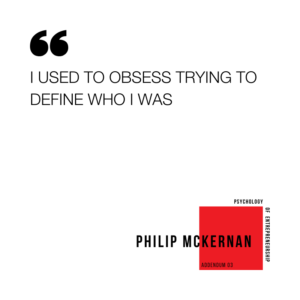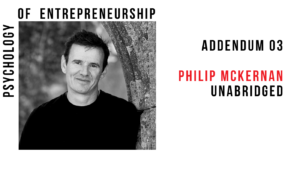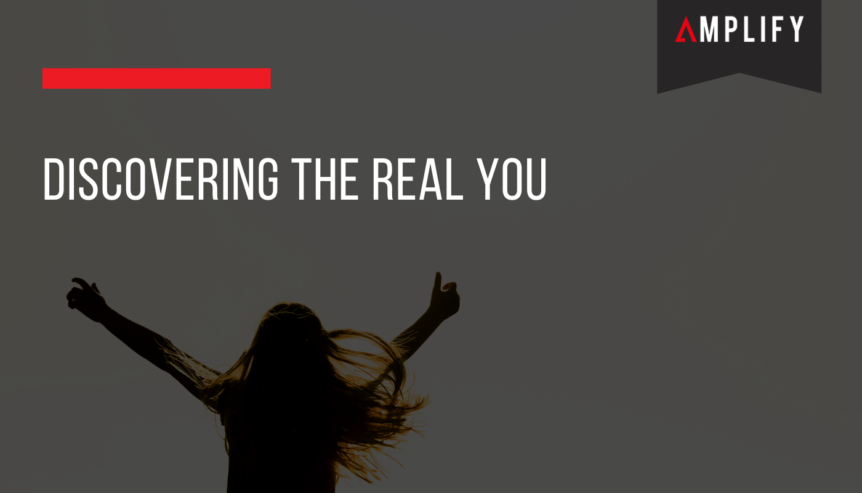Who am I? This is the difficult question we can often ask ourselves, and regularly struggle to answer with honesty and authenticity. Instead, we find comfort in conforming and take on a persona of what we think will be accepted, which usually coincides with a destructive internal dialogue.
Philip McKernan is more of a healer than a life coach. He travels around the world speaking about the importance of gaining greater clarity, overcoming personal obstacles, and creating deeper confidence to believe in yourself, inside and out.
In a recent Addendum volume of The Psychology of Entrepreneurship, Philip expanded on simple acts of self-reflection that can help bring clarity to who we really are. All of us – even you.
Ask Yourself The Hard Questions
“To know thyself is the beginning of wisdom.” These are the famously uttered words of one of history’s greatest philosophers, Socrates. When you break it down, what he’s really saying is, to really know yourself, you have to have a deep understanding of your strengths, weaknesses, passions, and even fears.
So, do you know who you really are? All too often we’re unwittingly guided by the ghostly voices of others, particularly when it comes to how we think, how we feel, who we love, how we look and who we are as a whole.
Before you know it, this running ticker tape of external information becomes deeply ingrained within us. We form an attachment to this thinking, and begin to hold it close to our hearts and accept it as truth.
Embarking on an inward search of what it really means to be you can be painful and hard, but also profoundly freeing. As one of the planet’s more thought-provoking life coaches, Philip McKernan likes to ask the tougher questions that many of us strive to avoid.
“Are you really a Catholic? Are you really a Christian? Are you really Buddhist? Are you really an engineer? Are you really a dentist? Is that what you meant to do? And is that what you want to do for the rest of your life?” he probes.
Self-knowledge may start to bring to the surface things that conflict with what we initially perceived as truth. Maybe you’re more selfish than you thought? Or secretly hate cats? Whatever the outcome, the purpose is to reflect objectively and without judgement on what is internally real for you.
When you start questioning the most important things in your life, you begin to loosen the grip on what you think is true, and establish what you know is true deeper within.
So, ask the questions of yourself that you typically avoid, consciously or otherwise.
Look For Answers In Your Past
As a society, we’re incredibly future-focused, often craving the nouveau and the now – pushing for things to move faster and forever forward. Psychologically, this is in part because we want to avoid certain elements of the past.
With the potential for going against the grain here, you may want to go back in order to move forward. Think about it- your past contains a wealth of wisdom about who you are. Any answers you’re looking for you should be right there, in your past.
Before you grab Doc and fire up the DeLorean to ride back to 1985, Philip warns, “I’m not a fan of looking in the rear-view mirror. It’s precarious, and it’s not going to work. Inevitably you’re going to crash.”
Instead, give yourself some time. “What I’m asking people to do is take six days, five days, two days out of their lives and consider it on a one-off basis to see what’s there.”
“We do a deeper dive into your past, to show you,” Philip explains, “Have a look at the past, compare it to your present, and ask these certain questions that relate to the bridge.”
What this does is shed some light on any entrenched patterns of behaviour that has materialised over many years, and gives you a greater understanding of its origins.
This then creates space to allow you to move forward with greater clarity.
“I think if people could understand intellectually and emotionally what they would get from that, I think they would do it in a heartbeat.“
Turn Self-Hatred into Self-Compassion
Do you ever find that you talk to yourself in an unrelentingly negative way? Self-criticism is a widespread problem, and shouldn’t be one that’s overlooked.
So many of us don’t feel good enough in our own skin. This is a monumental barrier if we want to create a truly meaningful life for ourselves.
“We judge very few people as badly as we judge ourselves,” Philips laments, “The suffering that we create within our own minds, within our own hearts, within our own souls.” There is a disdain that many of us have for ourselves.
From the way our bodies look to the way we perform professionally, this deeply set self-hatred can wrap itself around and fester alongside the things that we dislike about ourselves the most.
So, what’s the remedy for this swelling of mixed feelings of internal animosity, anger, or even resentment? Why it’s love and compassion, of course!
“When was the last time you experienced true, unequivocal, unwavering self-compassion?” asks Philip. “It’s a doorway into a healthy love and respect of self.”
Practising self-compassion is to be gentle, kind and understanding with yourself. It falls into the reality of accepting that you are not perfect, and there is potential for learning and growth in every aspect of ourselves.

The Psychology of Entrepreneurship
For more insight into Discovering the Real You, check out Addendum 03 of the Psychology of Entrepreneurship podcast hosted by Ronsley Vaz, with special guest Philip McKernan.
Author: Ronsley Vaz
Ronsley is the founder & chief day dreamer at AMPLIFY. He is an author, speaker & serial entrepreneur.
He has a Masters’ degree in Software Engineering and an MBA in Psychology and Leadership. He is known as the creator of We Are Podcast – the first Podcasting Conference in the Southern Hemisphere, and the host of The Bond Appetit Podcast and Should I Start a Podcast. He has an audience of over 3 million in 133 countries.

